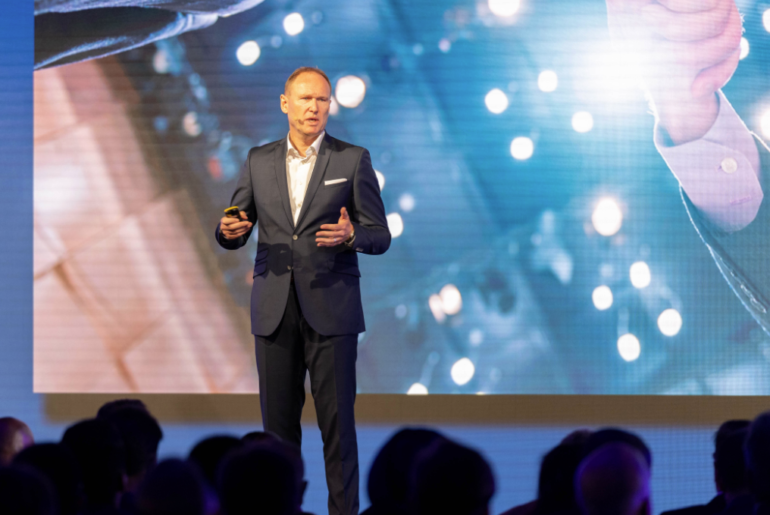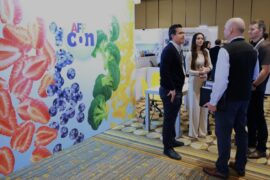The second annual Bühler Networking Days event was held August 26-28 in Uzwil, Switzerland under a “Creating Tomorrow Together” banner. It gathering provided a forum for manufacturers, industry partners, scientists and start-up company personnel to share ideas and provide inspiration for finding environmentally-friendly ways to feed a global population of nearly 10 billion people and help fulfill their mobility needs in 2050.
In opening remarks, Bühler Group CEO Stefan Scheiber stated: “We are ready to accept the challenge, and in fact we are convinced that this is a pathway to building sustainable businesses delivering sustainable solutions. But we are running out of time. That is why we have increased our sustainability goals. Our aim is to reduce energy requirements, water consumption and waste by 50% in our customers’ value chains. No business can do this alone. We need wide scale collaboration from every sector and part of the world.”
Bühler is a major producer of food processing equipment including optical sorting systems, as well as auto parts manufacturing machinery and other process technologies. Active in over 140 countries and operating at 30 production sites around the world, the Swiss family-owned company employs approximately 13,000 people and generated turnover of CHF 3.3 billion in 2018.
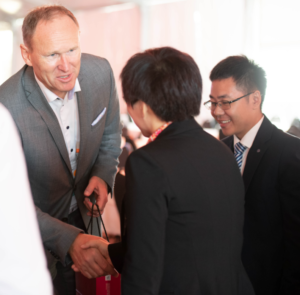
Stefan Scheiber welcomes guests to the event.
Dr. Gro Harlem Brundtland, former prime minister of Norway and former director general of the World Health Organization, addressed the gathering of some 800 experts, leaders, scientists and professionals from 500 companies and 82 countries attending the three-day event.
“There is no turning back,” she said. “The need for private sector engagement is stronger than ever. We cannot solve all the challenges without the resources, the expertise, the technology and brain power of business.”
Becoming Part of the Solution
“The challenges have accelerated dramatically. The world today is better, in many respects, than ever before. Yet the progress we have made comes at too high a price. We are using nature’s resources faster than our planet’s ecosystems can regenerate,” said CEO Stefan Scheiber. “But today we have the opportunity to make a real difference and shift course. Business has to be part of the solution.”
The Earth’s population is predicted to grow to 9.8 billion by 2050, with 70 percent of humankind living in urban areas. These shifts will put a strain on food and transport systems unless fundamental changes are made.
Sunny Verghese, group ceo of Olam International Limited and chairman of the World Business Council for Sustainable Development, underlined the importance of the challenges.
“You cannot produce the food, feed and fiber that all of us need if we destroy the planet,” he said. “There has to be an alternative way to do this on a more sustainable basis. Business as usual will not get us there, so do not accept the status quo.”
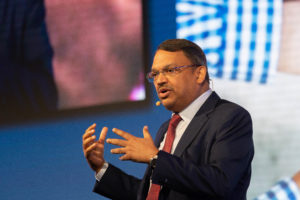
Sunny Verghese of Olam International Limited.
Good Reason for Optimism
The combined potential for change embodied by the businesses present at the Bühler Networking Days is enormous. Together they feed 4 billion mouths and provide mobility for 1 billion persons every day – a powerful lever for change. A good deal of the food of the future could be grown in fermentation tanks, rather than sourced from fields, ponds and oceans. Both disruptive new companies and incumbents are investing to address the consumer needs of today and the future. They are developing new technologies using bio-manufacturing and digital advances to revolutionize agriculture and increase yields to meet the world’s nutritional needs within environmental boundaries.
Saint-Gobain, representing the building and construction sector, brought the perspective of heavy industry to the gathering. “The built environment is one of the most emitting sectors, responsible for one third of the CO2 emissions in the world,” said Patrick Dupin, chief executive officer of Saint Gobain Northern Europe.
His company’s approach of pricing CO2 into innovation and investment projects was given as an inspiration for participants from other sectors. In mobility, participants shared ideas on how to achieve sustainability goals with advances in battery technology, shared mobility, and the development of autonomous vehicles, enabled by new digital technologies and increasing connectivity.
A third of global CO2 emissions are created by buildings, a third by mobility and a third by agriculture. The major players from each of these sectors were present at Bühler’s Networking Days 2019.
“In this room we have convened people that influence the three most important levers to make a change to carbon emissions,” said Ian Roberts, Bühler’s chief technology officer.
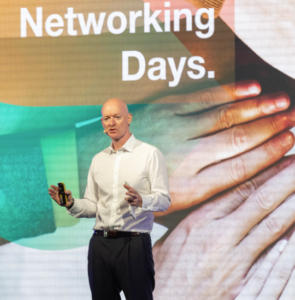
Bühler Chief Technology Officer Ian Roberts.
Power of Digitalization
A theme throughout the event was the power of digitalization to help meet these challenges.
“Digitalization has changed the world. It allows completely new technical solutions, changes how we collaborate, communicate and innovate. It is changing and disrupting our lives and, crucially, can help us to meet our sustainability targets,” said Roberts.
Bühler is already leveraging the power of IoT, Artificial Intelligence and big data to enable faster, smarter, better decisions. Bühler Insights, the first cloud platform dedicated to the food and feed industry, is helping to drive up yields, reduce waste, and improve food safety.
“Technology has a huge role to play,” said Roberts. “But it cannot solve these challenges alone. We also need to think and work across value chains and systems. We cannot achieve our targets by working in isolation. Collaboration is no longer an option – it must be a core competence in all businesses.”
Bühler is creating networks with industry partners, research institutes, universities, startups and not-for-profit organizations to broaden and deepen the knowledge and expertise focused on solving these challenges. A worldwide network for innovation has been createdthrough its 29 application and training centers.
This view was echoed by Stefan Palzer, executive vice president and chief technology officer at Nestlé Global, who said the world’s largest food company has launched an accelerator this year and opened it labs and made expertise available to startups to help them advance more quickly to valid prototypes.
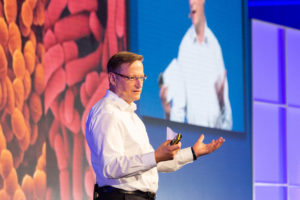
Stefan Palzer of Nestlé Global.
Collaboration is the Key
The Bühler event in Uzwil provided the opportunity for much networking across and within industries, and was the impetus for new collaborations. After just one day the gathering bore fruit, as MassChallenge, the largest global startup accelerator, and the World Business Council for Sustainable Development announced that they had agreed to collaborate to identify climate change solutions.
Minutes later, One Young World, a not-for-profit organization that promotes youthful leaders, offered its support.
John Harthorne, founder of MassChallenge, commented: “We will each get more value and impact out of the collaboration than we could get as individual entities.”
World Business Council for Sustainable Development Chairman Verghese added: “What I like about Networking Days is it’s not all about Bühler; it’s about bringing us all together.”
Become Part of the Solution
Perhaps no one could better embody the sense of purpose shared by participants at the event than Isabel Wijsen. At the age of 10, she and her sister founded a group in Bali to tackle the issue of plastic waste. Their “Bye Bye Plastic Bags” campaign succeeded in getting single-use plastic bags banned on the island and has since gone global.
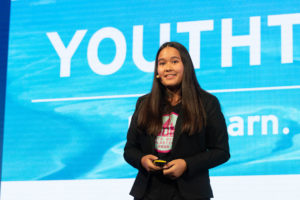
“Bye Bye Plastic Bags” campaigner Isabel Wijsen.
Bühler recognizes the potential in its own employees and already provides a platform for them to contribute their ideas about how the company should develop in future through Generation B. Kate Robertson, co-founder of One Young World, commented: “When you see a company as efficient, as innovative, as driven as Bühler taking their young talent seriously, you begin to see what the world of business can actually do.”
In closing the event, CEO Scheiber underscored the need to hand over a better world to future generations.
“We recognize the urgency of the challenges and have dramatically increased our sustainability commitments. It is now our goal to reduce energy, waste and water by 50% in all our future solutions, and make a significant impact in the value chains of our customers,” he said. “As industries, companies and individuals, we all have to ask ourselves how we can become part of the solution today. We hope that Bühler Networking Days 2019 will be seen as a turning point. The challenges are demanding, but we can do it.”
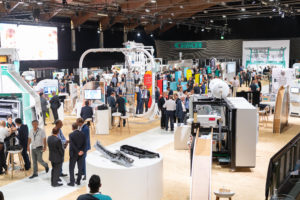
Bühler technology solutions on display.

